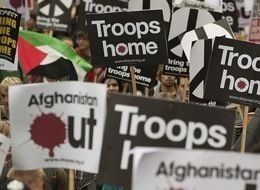Saturday, October 31, 2009
Antiwar Activists Reawaken as Obama Weighs Afghanistan Strategy
From: www.politicsdaily.com

Sitting in the front row at a Senate Foreign Relations Committee hearing, directly in sight of committee Chairman John Kerry, two women discreetly held up two pink cardboard signs that read "U.S. War = Terrorism" and "Drone Attacks Kill Civilians."
The women, Toby Blome and Martha Hubert, are part of Code Pink, a nationwide antiwar group that formed in 2002. They were quietly protesting the wars in Iraq and Afghanistan as former CIA agent Robert Grenier testified that a significant increase in troops is required to fend off al-Qaida in the latter country. Since the beginning of the Iraq war in 2003, Code Pink protesters had been a common, often colorful, presence on Capitol Hill.
But starting in 2006, when the Democrats took control of Congress, Code Pink and other antiwar groups lessened their activity. After Barack Obama was elected president, the antiwar movement stagnated.
"Fewer and fewer people were showing up for national meetings, and the fundraising dried up to almost nothing," said Susan Lamont, former president of the board of directors of the now defunct "Not in Our Name" antiwar group. Lamont said such organizations had assumed that Obama's election would mean a speedy withdrawal of U.S. forces from Iraq and Afghanistan, but they placed too much hope in him, considering his calls for a new focus on the Afghanistan war.
However, Scott Keeter, director of survey research for the Pew Research Center, said that people got what they wanted from Obama. "The protests that were associated with the war in Iraq have declined, but that's because the war in Iraq is winding down," he said. Keeter said it's important to makes a distinction between the general public and antiwar movement. "Generally speaking, Americans have never been much on movements," he said.
The public, according to Keeter, was staunchly opposed to the war in Iraq, but not the one in Afghanistan. "In public opinion, only a minority opposed" both, he said. So when Obama announced the Iraq withdrawal timetable, many people were satisfied and no longer saw the need to actively protest. But there were other factors in the decline of the antiwar movement, according to Eric Garris, director and founder of Antiwar.com. He cited a combination of war fatigue, domestic issues taking the forefront in public debate and the Bush administration leaving office.
"Unfortunately, a lot of the antiwar movement during the Bush administration was more anti-Bush than antiwar," said Garris, who added that Americans are more occupied with issues such as health care reform and the economic crisis. And many people were disillusioned after years of protesting without results.
With waning public approval of the Afghanistan war, however, antiwar groups have noticed an increase in support. "We've had a lot of decentralized action in October," said Gael Murphy, co-founder of Code Pink.
Antiwar actions such as the committee hearing protest, in which Blome and Hubert participated in earlier this month, have slowly started to reemerge. So far this year there have been eight official "disruption of Congress" arrests, compared with only four in all of 2008, according to Capitol Hill Police. These types of protests are likely to increase, said Murphy.
"There is a growing dissatisfaction with Obama's foreign policy and people are mobilizing," she said. "And I think we're going to see much more activity in the fall."

Subscribe to Comments [Atom]
